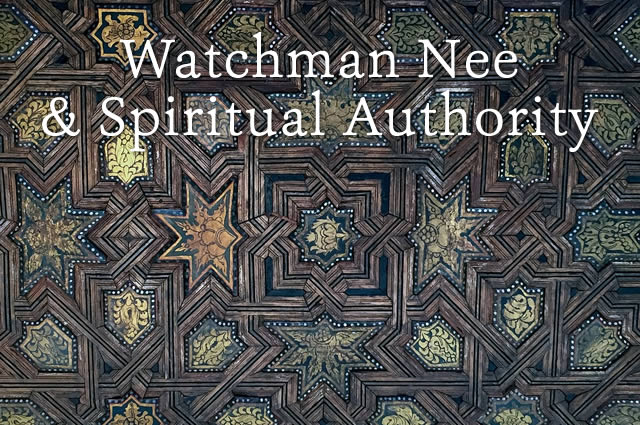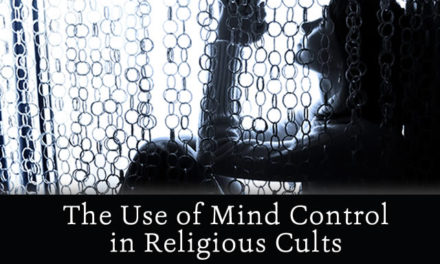“But be not ye called Rabbi: for one is your Master, even Christ; and all ye are brethren.” Matthew 23:8
“No man can serve two masters: for either he will hate the one, and love the other; or else he will hold to the one, and despise the other. Ye cannot serve God and mammon” Matthew 6:24.
Many who have grown up with a Christian background will know the name Watchman Nee. His books on living the Christian life have been staples for millions of believers both in America and around the world. At his birth in 1903 he was named Nee Shu-Tsu. His mother had promised God that if she were given a son she would consecrate him to God’s service. Later in his life Nee adopted the name Watchman because he saw his life ministry to be one of sounding a warning.
Nee established what are called House Churches in China before the Communists took control of the mainland in 1949. Nee objected strongly to the denominationalism he saw among the Western Christian groups working in China. He also thought that there should be only one church in a given locality, not multiple churches with competing loyalties.
Though there are serious problems with some of Nee’s teachings, one of which this article will address, perhaps God used Nee’s method of planting churches in homes to prepare the Church in China for the persecution it would face under the communist government. It seems to have borne fruit with reports of scores of millions of Christians meeting today in home-based churches away from government control or scrutiny. Nee was imprisoned in 1956 and died in 1972.
Many of the books that have Nee’s name on them are actually from the notes of his teaching, but not necessarily his own writing. Hence, quoting Nee is frequently to quote a second-hand source. Among the most popular titles are The Normal Christian Life, The Latent Power of the Soul, The Spiritual Man, Authority and Submission, and Spiritual Authority, for a total of over 40 titles. It is in this last title, Spiritual Authority that a serious error is taught.
A Doctrinal Problem
As with most people, Nee’s views were heavily influenced by the books he read and by the people he met. Prominent among those were mystics such as Jesse Penn-Lewis, and Madame Guyon. Nee was himself a mystic and pietist. He sought to teach how a Christian could experience “the deeper life” in Christ and so be empowered to fulfill God’s will in his life. This is a completely appropriate desire for every Christian.
However, if a Christian teacher is not subjecting his teaching to the scrutiny of other recognized and qualified Bible teachers he is running the risk of drifting off course. The mystical and pietistic teaching attracted him to the Keswick Movement and other deeper life teachers. Unfortunately some associations led to problems affecting the priesthood of the believer and biblical followership.
Possibly the greatest influence was the Chinese culture in which he grew up. To some extent we are all shaped by our culture. Ideally our Christian faith should shape us, and our culture, for the better. We should always be alert to influences from our culture that may be at odds with the Bible and be ready to shed their sway upon our thinking. But a cultural influence can be so subtle that it is difficult to spot a conflict.
In China Confucianism has strongly influenced the social milieu. The primary impact has been on education, relationships, and loyalty. It is this last element of Confucian teaching that is perhaps the reason for a significant departure by Nee from biblical teaching on leadership and individual responsibility. Confucian teaching says that a child’s duty is to obey his parents throughout his whole life, even if they are wrong.
Loyalty is of supreme importance to the Confucian social structure. Consistent with this ethic Nee advocated an authoritarian spiritual leadership in Christian relationships including an automatic submission to spiritual leaders, even when they are wrong. When this loyalty conflicts with one’s own judgment of right and wrong, loyalty must come first. In this line of thinking, God will sort things out in His way.
This view is expressed in Nee’s book Spiritual Authority on page 71.
“If God dares to entrust His authority to men, then we can dare to obey. Whether the one in authority is right or wrong does not concern us, since he has to be responsible directly to God. The obedient needs only to obey; the Lord will not hold us responsible for any mistaken obedience, rather will He hold the delegated authority responsible for his erroneous act. Insubordination, however, is rebellion, and for this the one under authority must answer to God.”
Because of Nee’s sincere and deep commitment to the Christian faith and his successful teaching ministry his books found a wide audience outside China. That audience was made up of people who sought a very deep and intimate relationship with Christ that empowered them to serve Him faithfully, which is good. However, unchecked any one of us can slide into teaching that promotes error. Only the scriptures are infallible. Any other source must be questioned as the Bereans questioned Paul.
What the Bible Says About Leaders and Followers
The primary example of leadership for the Christian is Jesus. Afterward, His example was modeled by the Apostles. That example is servant leadership. It is the form of leadership that is most appealing, and the most effective, to our human condition. It is a form of leadership that guides the followers rather than ordering them. It is intended to meet the needs of the followers while also equipping them to succeed on their own. Command authority has its place in certain settings such as the military. But even history bears out that military commanders who sought to meet the needs of their troops won a level of loyalty that command alone could never achieve.
The New Testament contains a number of texts that give us a clear picture of what we should look for in leadership, and in those who follow. Let’s look at some of them.
Matthew 20:25-28 – But Jesus called them unto him, and said, “Ye know that the princes of the Gentiles exercise dominion over them, and they that are great exercise authority upon them. But it shall not be so among you: but whosoever will be great among you, let him be your minister; and whosoever will be chief among you, let him be your servant: Even as the Son of man came not to be ministered unto, but to minister, and to give his life a ransom for many.”
Matthew 23:8 – “But be not ye called Rabbi: for one is your Master, even Christ; and all ye are brethren.”
In the Gospel of Matthew Jesus repeatedly uses His confrontations with the Pharisees to teach His disciples two important lessons. One is how they should not lead, and the other is how they should lead. His own example was to serve them. When He washed their feet He demonstrated a humility that captures the human heart. But when He denounced the Pharisees He was also denouncing authority that had grown corrupt because it had left behind any real care for the weak and poor and concerned itself with its own position. This is one of the inherent dangers of authority that is based solely upon position, or hierarchy.
1 Peter 5:2,3 – “Feed the flock of God which is among you, taking the oversight thereof, not by constraint, but willingly; not for filthy lucre, but of a ready mind; Neither as being lords over God’s heritage, but being ensamples to the flock.”
Our fallen nature can cause us to fall into traps in our thinking. We can think like the world does that we deserve services and privileges because of our position of responsibility. So, where do we see that in Jesus model? We don’t. But, both the Pharisees and Christian church history is replete with examples of leaders who fell into such traps. One example is in 3 John 9-10.
“…but Diotrephes, who loveth to have the preeminence among them, receiveth us not. Wherefore, if I come, I will remember his deeds which he doeth, prating against us with malicious words: and not content therewith, neither doth he himself receive the brethren, and forbiddeth them that would, and casteth them out of the church.”
Spiritual Covering
One of the concepts that usually accompanies delegated authority is that of a “covering” under which the follower, or disciple, is protected against temptation or evil attacks. This concept maintains that as long as the disciple is submissive and obedient to his discipler God will not allow attacks from Satan. This is a very attractive promise to those who have bought in to the delegated, or hierarchical, structure concept. It is also called an “umbrella of protection.”
The term “covering” is never used in the New Testament in the sense described above. It was primarily a cultural custom implying submission. In Israel and the surrounding pagan cultures women were to be veiled, or covered, so as to not bring shame on their husbands. A woman whose head was uncovered in public was implying she was a prostitute. It is the same kind of cultural custom as a man taking off his hat when he enters a building. Such customs are signs, but are not protective in and of themselves. I Corinthians 11:3-12 speaks of this covering but the passage does not speak of protection from temptation or evil.
A Volatile Mixture
When the concept of delegated authority, or the chain of command, are mixed with the concept of a “covering” mischief will inevitably occur.
On the surface the Bible seems to teach some kind of spiritual hierarchy and the writer of Hebrews did say in chapter 13:17, “Obey them that have the rule over you and submit yourselves.” And it seems logical on the surface that if God intends us to “obey” our spiritual leaders there must be some spiritual benefit, like protection, that derives from that submission. However, what seems to be is completely false.
The word translated “obey” in the above text is peitho. Thayer’s lexicon says it means “to suffer one’s self to be persuaded.” Persuasion is far different from submission to command. Destructive cults operate on the command structure, either overtly or covertly, and leave broken lives trailing behind. We should be persuaded to follow a godly leader because he models Christ.
The key word in this authority/covering concept is control. But Jesus told us at Matthew 6:24, “No man can serve two masters: for either he will hate the one, and love the other; or else he will hold to the one, and despise the other.” Whatever the “master” it will be one or the other. In the context here, either a human leader will be our master, or God will be. It cannot be both. When we learn to submit to men in the way we should submit to God we will never submit to God.
Groups Influenced by Nee
Numerous spiritual leaders and groups have adopted Nee’s prescription for Christian leadership and discipleship. A brief listing follows:
- The International Churches of Christ – Also known as the Crossroads Movement this cult offshoot of the Church of Christ practices a very strict hierarchical control of everyone in the movement. Serious abuses and failures of this system have in recent years led to a backlash that is advocating reform. Flavil Yeakley’s book, The Discipling Dilemma, provides insight into the abuses of this system.
- The Shepherding Movement – Begun by “The Ft. Lauderdale Five”, Don Basham, Ern Baxter, Bob Mumford, Derek Prince, and Charles Simpson, these five teachers formed the Christian Growth Ministries. Using Nee’s teaching about delegated authority discipleship groups were formed that exerted controls on an individual’s everyday decision-making. Ron and Vicki Burks book Damaged Disciples tells their personal story of disillusionment and recovery. Later the founders of the movement recognized the abuses, repented, and apologized.
- The Bible Speaks / Greater Grace World Outreach – Founded by Carl Stevens in Maine this “church,” now located in Baltimore, is currently being torn apart because the “dissidents” have found a voice on the Internet and awakened many to the abuses done under the “covering” of Nee’s delegated authority doctrine.
- The Institute in Basic Youth Conflicts / Institute in Basic Life Principles- Founded by Bill Gothard, this organization was built on the seminars presented in packed arenas around the country. Nee’s delegated authority and covering terminology is called the chain of command and umbrella of protection in IBLP. Don Veinot and Ron Henzel’s book A Matter of Basic Principles addresses the abuses found in this group.
There are innumerable other groups that employ the delegated authority concept. It is better to know the Biblical truth of spiritual leadership and discipleship than to remember a list of groups teaching the error.
Conclusion
The groups that have focused on this concept of authority/submission as defined by Watchman Nee have left behind a trail of tired, burned out, and spiritually wounded Christians. It is not the way Jesus would have his people be led. He said His yoke was easy, not hard. He said He would give us life abundant. He said His strength would be ours for service. When the fruit of a ministry is bad then the root of it must be inspected. When our energy for Christian service is being depleted we must be burning the wrong fuel.
Humanly speaking an imposed command structure can be an efficient way to make things happen outwardly. However, the Church is all about relationships, persuasion, and modeling. What we see in Jesus is encouragement, selfless giving, and equipping the individual to be obedient to the Spirit within him. He gave the perfect example for leaders; servant leadership.
A command structure is diametrically opposed to the method of leadership Christ prescribed for relationships in the church.
By David Henke







